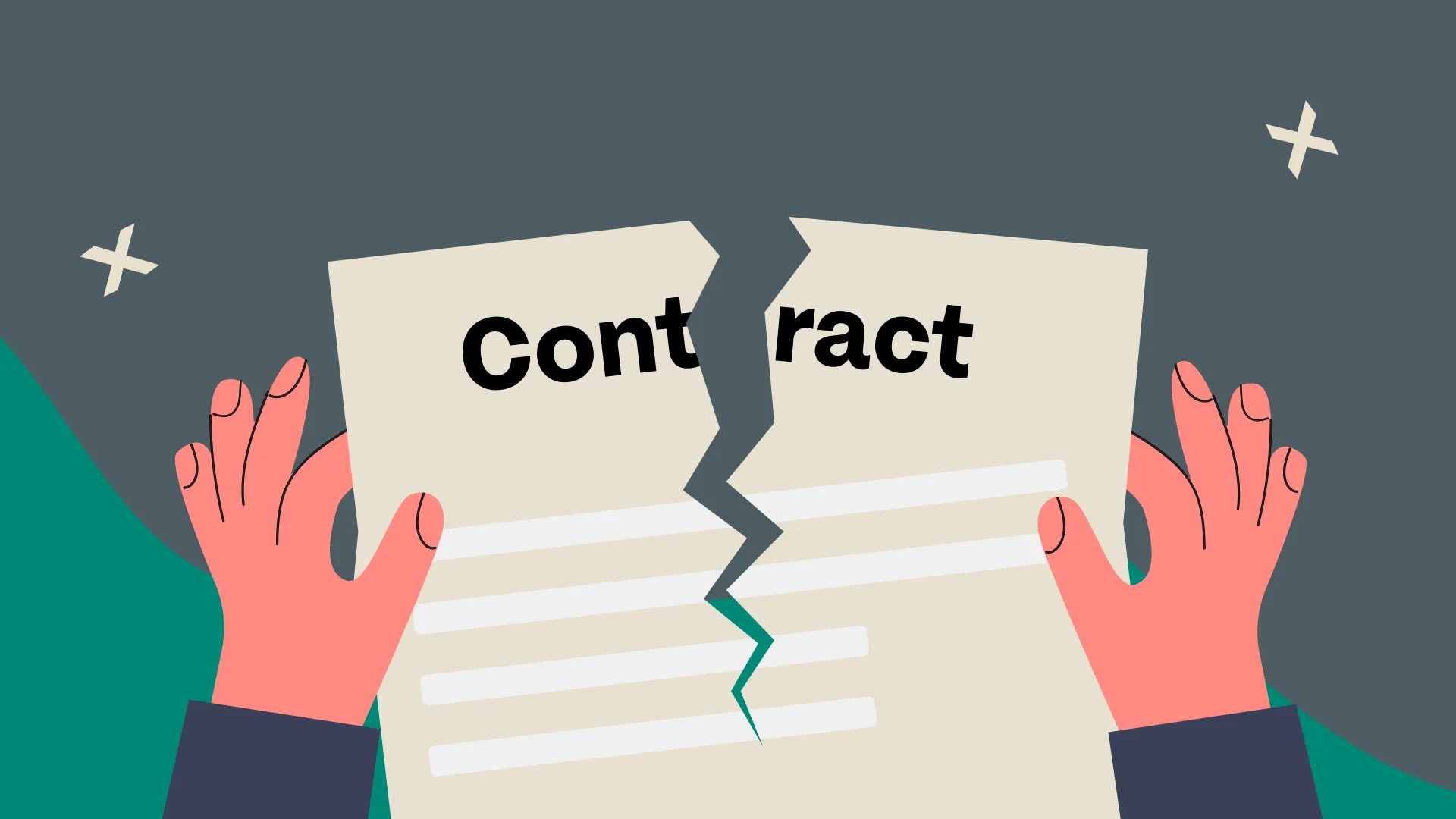A breach of contract refers to a situation when one or more parties fail to fulfill the agreed-upon terms and conditions stated in the contract. It has consequences depending on what the contract says. The party that did not breach the contract may pursue compensation to recover losses incurred.
It is worth noting that the repercussions of the breach may extend beyond monetary damages. The breach could damage the breaching party’s reputation and strain the relationship between the parties involved, leading to a loss of trust and future business opportunities.
This is why it’s crucial to understand contractual obligations. It helps everyone involved to have a clear understanding of what is expected and to assess whether the terms are fair and reasonable.
In this article, we’ll cover:
Types of breach of contract
There are various types of breach of contract, each with its own implications and consequences. Understanding these different types can help parties involved in a contract to assess the severity of the breach and determine the appropriate course of action. Here are some common types of breach of contract:
1. Material breach vs. minor breach
A minor breach of contract happens when there is a failure to fulfill insignificant aspects of a contractual agreement. But overall, the contract can still be considered fulfilled.
For example, you purchase a secondhand watch from a friend and discover that the battery is absent. Here, the absence of the battery does not significantly impact the overall fulfillment of the contract. That’s because the primary objective was to acquire the watch.
Whereas a material breach occurs when you fail to fulfill the fundamental aspect of the contract. Which fails the entire contract.
For example, you were supposed to receive $1000 for creating a website design for your client. But after you complete the job, you only receive $500. Here, there has been a violation of major terms of a contract.
The consequences of a material breach are usually more severe, and the non-breaching party may have the right to terminate the contract and seek damages.
2. Anticipatory breach
An anticipatory breach of contract occurs where one party, after entering a contract, fails to fulfill their obligations just before the agreed-upon due date.
For instance, if X promises to join Y’s company in July but refuses to do so by the end of June, it constitutes an anticipatory breach.
This type of breach allows the non-breaching party to consider the contract as terminated and pursue remedies for the breach.
3. Fundamental breach
A fundamental breach occurs when one party fails to fulfill a crucial obligation, preventing the other party from receiving the expected benefits from the agreement.
For example, A and B agree to open a noodle shop. A is responsible for obtaining raw materials, and B is responsible for cooking the noodles. But A fails to provide the raw materials, thereby hindering B’s ability to make the noodles, which is a fundamental breach.
It is a serious breach that goes against the essential terms and conditions of the contract, making it impossible or futile for the non-breaching party to continue with the contract. In such cases, the non-breaching party may have the right to terminate the contract and claim damages.
4. Partial breach
A partial failure of a contract while the overall agreement remains intact and valid is referred to as a partial breach of contract.
For example, a party may fail to make the specified payment in full or distribute only a portion of the agreed-upon quantity of the product.
This type of breach may entitle the non-breaching party to seek compensation for the specific part of the contract that was not fulfilled while still holding the breaching party responsible for the remaining obligations.
Elements of a valid contract
Certain key elements must be present for a contract to be considered valid. These elements establish the foundation of a legally binding agreement between parties and protects a party from breach of contract. Here are the essential components of a valid contract:
1. Offer and Acceptance
Offer and acceptance are fundamental elements of a contract. An offer includes the terms and conditions for one party to enter into a legally binding agreement with another party. Acceptance, on the other hand, signifies agreement with the terms and conditions stated in the contract. Both the offer and acceptance must be communicated between the parties involved.
2. Consideration
Consideration involves parties exchanging something of value as agreed upon in the contract after fulfilling their respective obligations. This valuable consideration can be anything like money, services, goods, or other agreed-upon items. Without consideration, an agreement may be perceived as a unilateral promise or a mere gift rather than a contract.
3. Legal capacity
Legal capacity is a person’s ability to enter into a contract. This means they must be of sound mind and have the legal ability to understand the terms of the contract and be bound by its obligations. It depends on factors like age, mental state, and intoxication. If a person is below 18 years of age, mentally unfit, or under the influence of intoxicants, they lack the legal capacity to form a binding contract.
4. Mutual assent
Another critical element of a valid contract is mutual assent, also known as a meeting of the minds. Only when both parties entering a contract agree upon the same thing can the contract be termed valid. If there is no agreement, there’s no contract.
5. Lawful purpose
A contract must have a lawful purpose. Promises within the contract must not be illegal, fraudulent, or against public policy. If the parties agree to engage in illegal activities through the contract, the contract becomes invalid.
Common causes of breach of contract
Breach of contract can occur for various reasons, often resulting from the failure of one or more parties to fulfill their obligations as agreed upon in the contract. Understanding these common causes can help parties identify potential risks and take necessary precautions to prevent or address breaches. Here are some common causes of breach of contract:
1. Failure to perform as promised
A breach of contract usually occurs when one party fails to perform the task as promised in the contract. It can happen due to unforeseen events, financial difficulties, or lack of resources, or it can also be intentional.
2. Non-payment or late payment
When a party fails to fulfill their payment obligation as stipulated in the contract within the agreed-upon deadline, a breach of contract occurs.
3. Failure to meet deadlines
Contracts often include specific deadlines or milestones that must be met. If a party fails to meet these deadlines without a valid reason, it can lead to a breach. Timely completion of deliverables is crucial for maintaining the integrity and smooth flow of the contractual relationship.
4. Poor-quality work or products
One common reason for a breach of contract is when the product or service provided is of poor quality, fails to meet the agreed-upon standards, neglects safety requirements, or does not comply with applicable laws.
5. Breach of confidentiality
If any party violates the terms of the contract and discloses confidential information, it constitutes a breach of contract.
6. Breach of non-compete agreements
Non-compete agreements are common in contracts, particularly when involving business partnerships or employment relationships. If a party violates a non-compete clause by engaging in competing activities, it can result in a breach of contract.
Remedies for breach of contract
When a breach of contract occurs, various remedies are available to the non-breaching party to address the harm caused and seek appropriate redress. Here are some common remedies for breach of contract:
1. Damages
Damages are the most common remedy for breach of contract and are designed to compensate the non-breaching party for the losses incurred. Different types of damages may be awarded:
- Compensatory damages: These are monetary damages intended to place the non-breaching party in the position they would have been in if the breach had not occurred. It covers the direct and foreseeable losses resulting from the breach.
- Consequential damages: Also known as special damages, these are damages that go beyond the direct losses and arise from the specific circumstances of the breach. They cover indirect or unforeseeable damages that were reasonably foreseeable at the time of contract formation.
- Punitive damages: In some cases, punitive damages may be awarded to punish the breaching party for particularly egregious conduct. However, punitive damages are less common in contract law and are typically awarded in cases involving fraud, bad faith, or intentional misconduct.
2. Specific performance
Specific performance is a legal remedy available to the non-breaching party. They can seek assistance from the court to compel the breaching party to fulfill the obligations outlined in the contract rather than solely seeking compensation. Specific performance is typically granted when monetary damages are inadequate to compensate the non-breaching party adequately, such as in cases involving unique or rare goods or services.
3. Rescission and restitution
Rescission involves canceling the contract and returning the parties to their pre-contractual positions. It is often used in cases where one party has engaged in fraudulent or deceptive practices. Restitution involves returning any benefits or payments made under the contract, ensuring that both parties are restored to their original state.
Defenses against breach of contract claims
In many cases, a party cannot do what he was supposed to do under the contract, and at that time, they have several defenses to explain why the breach of contract happened. So here are some common defenses against breach of contract.
1. Impossibility of performance
Sometimes, even if the party doesn’t intend to breach the contract, some uncertainties cause the breach. The impossibility must be genuine, unforeseeable, and beyond the control of the party invoking the defense. For instance, unpredictable events like natural calamities, war, pandemics, etc., can prevent parties from performing their obligations. In such cases, the defense may argue to discharge the contract.
2. Impracticability
Similar to impossibility, the defense of impracticability asserts that the performance of the contract has become unreasonably difficult or costly due to unforeseen circumstances. The change in circumstances must be substantial and not something that the breaching party could have anticipated or controlled.
3. Duress or undue influence
If one party was forced or coerced into entering the contract or a significant power imbalance led to unfair terms, the defense of duress or undue influence may be raised. This defense asserts that the contract was not entered voluntarily and should therefore be deemed unenforceable.
4. Misrepresentation or fraud
If you can prove that the other party deceived you with the contract’s terms and convinced you to sign it, misrepresentation or fraud can be a strong defense against a breach of contract claims, allowing you to argue that the contract is unenforceable.
5. Mutual mistake
When both parties to a contract make a material mistake about a fundamental aspect of the agreement, the defense of mutual mistake can be invoked. This defense argues that the mistaken belief voids forming a valid contract.
6. Lack of capacity
Lack of capacity provides a strong defense against a breach of contract. As a contract is signed by a minor who lacks the mental capacity to understand right and wrong, by a mentally ill person who cannot make wise decisions, or by someone under the influence of intoxicants, the contract becomes invalid.
Steps to take when a breach occurs
When a breach of contract occurs, it is important to take prompt and appropriate action to protect your rights and interests. Here are some steps to consider when faced with a breach of contract situation:
1. Review the contract terms
Start by carefully reviewing the contract to fully understand the specific obligations and provisions that have been violated. Identify the nature and extent of the breach to assess the potential impact on your rights and determine the appropriate course of action.
2. Communicate with the other party
Contact the breaching party to discuss the breach and express your concerns. Clearly communicate your position and expectations regarding the resolution of the breach. Open dialogue may help clarify misunderstandings or identify potential solutions.
3. Document the breach
Document the details of the breach, including dates, times, and any relevant evidence such as emails, invoices, or delivery receipts. This documentation will support your case if legal action becomes necessary.
4. Seek legal advice
Consult with a qualified attorney who specializes in contract law. An attorney can assess the situation, advise you on your rights and options, and guide you through the legal process. They can help evaluate the strength of your case and determine the most effective strategy for pursuing a remedy.
5. Explore negotiation and alternative dispute resolution methods
Before resorting to litigation, consider exploring negotiation or alternative dispute resolution methods, such as mediation or arbitration. These processes can provide a more efficient and cost-effective means of resolving the breach and reaching a mutually acceptable solution.
Avoiding breach of contract
To minimize the risk of breach of contract, it is essential to proactively take steps to avoid potential issues and ensure the smooth execution of agreements. Here are some key strategies for avoiding breach of contract:
1. Draft clear and precise contracts
While drafting a contract, ensure everything is written in simple and clear language. As, ambiguous sentences may be perceived differently by the other party, varying from what you mean. Ultimately causing misunderstanding and breach of contract. Therefore, keep your contact clear and precise.
2. Conduct due diligence before entering into contracts
Before you enter into a contract, carefully study and understand the parties involved in the contract, examine the crucial documents, carefully review the proposed contract, and, if necessary, seek professional assistance. This diligent approach ensures the prevention of potential risks of breach of contract and enables informed decision-making.
3. Regularly review and update contracts
Contracts should not be considered static documents. Regularly reviewing and updating your contract provides an invaluable opportunity to address outdated clauses and terms. This ensures that the contracts remain relevant, enforceable, and aligned with the evolving needs of the parties involved.
4. Establish dispute resolution mechanisms
To avoid any complexity in the future, you must include a clause in your contract outlining the process for resolving any future disagreements, such as mediation or arbitration clauses. Clearly outline the procedures for dispute resolution to facilitate timely resolution and mitigate the risk of breach.
Conclusion
Breach of contract occurs when a party fails to fulfill any task stated in the agreement, whether due to impossibility or intentional actions. This can have severe consequences, such as financial loss or damage to your relationship with the other party.
Therefore, It is essential to thoroughly understand the contract’s terms and conditions and seek guidance from a legal advisor. They will assist you in comprehending the contract before signing and taking appropriate action in case of a breach.
By utilizing Signeasy’s electronic signature and contract workflow platform, parties can securely and conveniently sign and execute contract amendments or settlement agreements. The platform provides robust document tracking and audit trails, ensuring transparency and legal compliance. In the event of a breach, these features can be instrumental in establishing a clear record of contract revisions and actions taken to resolve the dispute.
Signeasy’s user-friendly interface and customizable workflows enable parties to efficiently collaborate on contract revisions and obtain necessary approvals. The platform’s secure storage and access controls also help protect sensitive contract documents and facilitate their retrieval during legal proceedings.
Start your free trial and see how Signeasy can simplify your contract workflows and protect your business interests.












